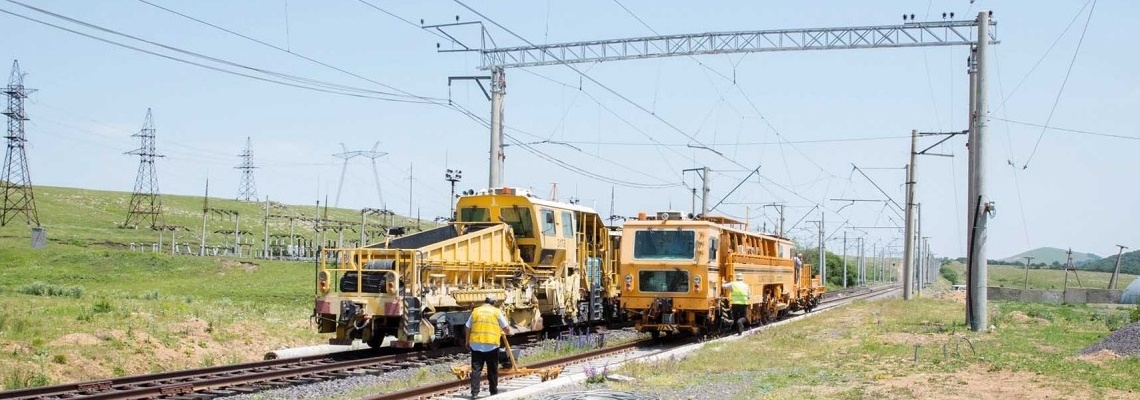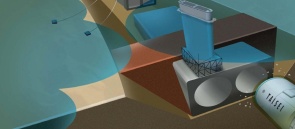Frequently asked questions about railway project connecting Turkey to Azerbaijan and Central Asia:
What is the route?
As seen in above map, railway starts in Baku(Azerbaijan), goes westwards to Tbilisi(Georgia). On the 23th km of Tblisi-Gyumri(Armenia) railway, splits towards west to Akhalkalaki, and then south to Kars.
What’s being done on this route?
Baku-Tblisi: Currently used actively by Azerbaijan and Georgia. Nothing to be done on this section.
Marabda(Tblisi)-Akhalkalaki: This 160-km-long section was constructed in 1986, but rarely used. Thus the line had to be inspected and renewed for this project.
Akhalkalaki -Kars: This 101-km-long section is under construction by Turkey. This section has 22 tunnels (18 km long in total) and 2 viaducts (550 m in total).
The differences between rail gauges?
Baku-Tbilisi-Akhalkalaki section is broad gauge (1520 mm), same with Georgia and Azerbaijan.
Akhalkalaki-Kars section will be standard gauge (1435 mm), same with Turkey.
Transhipment or axle-change will be needed at Akhalkalaki.
When the project will be commissioned?
As announced by ministers of three countries involved in the project, the construction works will be completed this year, and trains will run on the line in 2017.
How will loads be transported?
Due to break of gauge, there are two options for transportation between Turkey and Azerbaijan/Georgia:
First option is transhipping the loads from one wagon to other at Akhalkalaki. Especially container trains will chose this way.
Second is changing the axles of wagons at Akhalkalaki and continue. But since the wagons of Azerbaijan Railways is wider, they may not be allowed to continue further than Kars. Then Kars Logistics Center will probably be the place for storage and transhipment of goods.
Will passenger trains run on line?
Azerbaijan Railways ordered 30 sleeper and dining car vehicles to run on this line. Stadler will deliver the wagons this summer. Wagons can run on different railway gauges. Thus, passengers can travel from Baku to Istanbul without any transhipment. Travel from Baku to Istanbul by train will last 1 day (see Sleepers for Baku Tbilisi Kars).
For which transports this line will be used?
Of course for transports between Azerbaijan, Georgia and Turkey.
This line may also be a strong alternative for transports between Central Asia (Kazakhstan, Turkmenistan) and Turkey.
The trains between China and Turkey may also use this line.
Will there be a continuous rail connection between China and Europe with this project?
The sentence “continuous rail connection between China and Europe will be possible with Marmaray and Baku-Tbilisi-Kars project” is widely used.
If break of gauges and ferry transport at Caspian sea are not problem for the term “continuous”, there’ll be a continuous line.
But if they are not problem, it must be noted that there’s a continuous line from China to Europe via Turkey even today, via Iran and Tekirdag-Derince ferry.
What’s the advantage of this line compared with line via Iran?
The sanctions were one of the advantage, which have just been lifted.
Low capacity of Van Lake ferries is anothed disadvantage of Iran line, but ferries are going to be replaced soon (first in May 2016).
The transit time and cost of both alternatives will always be compared.
What are the targets?
The line will have an annual capacity of 1 mn passengers and 6.5 mn to of freight at the beginning. Target is 3 mn passengers and 17 mn to of freight in 20 years.
The line is expected to be an alternative to China-Europe transports which currently being done by Russia.
Cover Photo: Azerbaijan Railways ©
Categories: Railway Infrastructure








Thanks for the update on this project, Onur. I very much enjoyed my rail journey form IST to Kars in September. I heard about this project from passengers on the Dogu Express and decided, I would definitely like to be one of the first to take this journey when completed , taking the Dogu Express again. spending more time in Kras and continuing onto Baku.
I’m looking forward to doing the same journey too. 🙂
When the contract with Stadler to build the sleeping coaches for this route was announced in June 2014, I commented in the article (link above) that it would be interesting to see what TCDD does to provide an international service prior to the arrival of the new coaches. That was when the route was expected to open in 2015, having already been delayed from 2014. Now the route is expected to open in late 2016, so the new coaches should arrive at just the right time.
Update:
According to the Azeri news agency Trend, Stadler are already beginning the construction of the new fleet of coaches.
http://en.trend.az/azerbaijan/business/2496700.html
Looks like there is a new start date for the Baku Tbilisi Kars railway project in mid 2017, will this railway ever be finished ?. It was supposed to finish in 2014!